Understanding the Advantages of MOBOTIX's Decentralized Surveillance Camera System
MOBOTIX - A Thought Leader in Surveillance System Architecture
MOBOTIX was one of the very first IP video surveillance cameras. They revolutionized by moving things from an analog coax connection to the camera to an IP-based image and IP transmission. The company also was a renegade in regards to the architecture of their IP surveillance solution, and MOBOTIX - up to this day - continues to have many unique not-well-known advantages that makes the MOBOTIX system one of the best and most secure surveillance platforms in the world.
Designed to Not Fail
The Internet was originally conceived as a redundant fail-proof communications network for the DOD (Department of Defense) designed to survive catastrophic network disruption in a case of highly destructive war. The mission was to ensure survivability of the communications infrastructure by not having a single point of failure and MOBOTIX decided from the beginning to adhere to the same principle when building the architecture of the MOBOTIX surveillance platform (which makes sense for a security system).
The entire MOBOTIX surveillance system is composed of independently operating intelligent cameras (which MOBOTIX calls their IoT cameras) which all simply connect to the companies network. (Best practices dictate to keep all cameras and related equipment in a separate surveillance VLAN on the same physical network.)
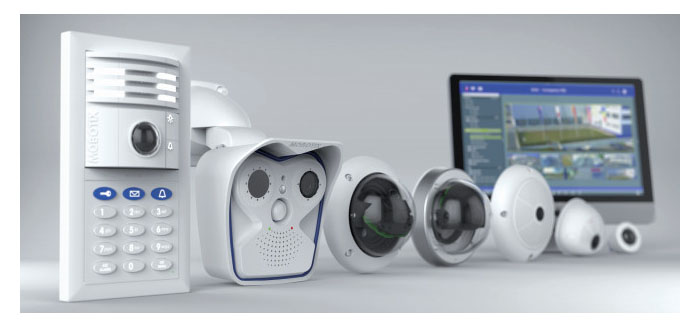
No Single Point of Failure & Autonomous Intelligence
These independent intelligent cameras not only “see” and transmit but also manage the recording and decide when and where to record. The cameras either record 24/7 or, better, record only when there is activity. This is called event-based recording. MOBOTIX cameras have enough intelligence, capability and settings to enable tuning each camera location to what is real activity and what is not. The cameras can store internally on inexpensive SD Cards, externally on on-premise NAS drives or in the cloud, depending on the needs of each project.
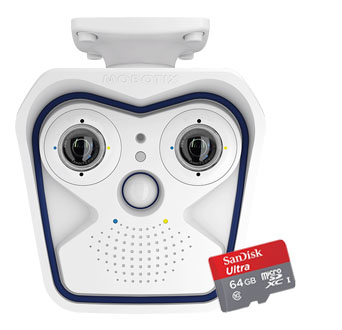 MOBOTIX’s capability of storing in both SD card and in the cloud has unique advantages. Now it’s possible to keep days of high quality images locally in SD memory and have lower resolution files in the cloud to save bandwidth while ensuring long retention and safe off-site storage. MOBOTIX’s patented ActivitySensor™ analytics enables cloud storage better than others since the camera intelligently discerns what constitutes an event and saves bandwidth and time when viewing.
MOBOTIX’s capability of storing in both SD card and in the cloud has unique advantages. Now it’s possible to keep days of high quality images locally in SD memory and have lower resolution files in the cloud to save bandwidth while ensuring long retention and safe off-site storage. MOBOTIX’s patented ActivitySensor™ analytics enables cloud storage better than others since the camera intelligently discerns what constitutes an event and saves bandwidth and time when viewing.
MOBOTIX’s intelligent cameras know what to record and how to record it.
The cameras manage all of their recordings themselves by writing directly to NAS (Network Attached Storage) as opposed to NVRs (Network Video Recorders). NAS devices are basically drives on the Network and each MOBOTIX camera defines where and how long to record and retain the video (i.e., 30 days or up to a certain amount of space). This means that no NVR recorder or “server” is needed to manage the recording. NVRs are much more expensive than NAS appliances and since they have to “process” and manage all video they typically can only handle a fraction of the “camera load” (number of cameras) per NVR/VMS. Considering that NAS devices are basic network attached drives and that several tend to be used in parallel on the same network while the cameras can switch from one to the other, if one fails then the storage aspect again has no single point of failure. In addition, NAS architecture keeps the overall cost down and reduces maintenance.
NVR/VMSs are much more expensive and also “lumpy.” They have a smaller and more rigid limit as to how many cameras they support and require more units or servers for a project compared to a NAS-based solution. Redundancy can be built with VMS solutions but that usually means a very complex setup with windows servers and duplication of hardware - and even more costs. NAS are basic powered drives on the network with minimum processing. NVR/NAS are full blown servers with their own Operating System, custom FW, the VMS application itself, security updates and high mostly recurring licensing fees.
Distributed Intelligence and Autonomous Operation
The real difference is where the intelligence is. With MOBOTIX solutions the processing is mainly done in the cameras themselves by low energy consuming specialized distributed processors. With NVR/VMS systems, cameras tend to not be “Not Intelligent.” All processing, image analytics, decisions to record or not, disc maintenance, retention management, etc., are all done in a central server which typically is a high-end computer with a lot of CPU, memory, power and will need a dust-free space and cooling. The space and power needed for multiple servers needed may almost double if redundancy is desired! The operating system, licenses and running power plus cooling power costs can in a few years outweigh the initial investment of the entire system. With MOBOTIX, the “CPU” for each camera is in the camera itself and the “heat for CPU processing information” dissipates into the air regionally by each camera with no central thermal concentration that requires further energy to accomplish system cooling.
From a systems management and network security point, the simpler and more elegant MOBOTIX architecture reduces maintenance costs, provides higher uptime and is more secure.(*More about security in MOBOTIX’sOutline of the MOBOTIX Cactus System.)
Local Decentralized Intelligence & Simpler Architecture
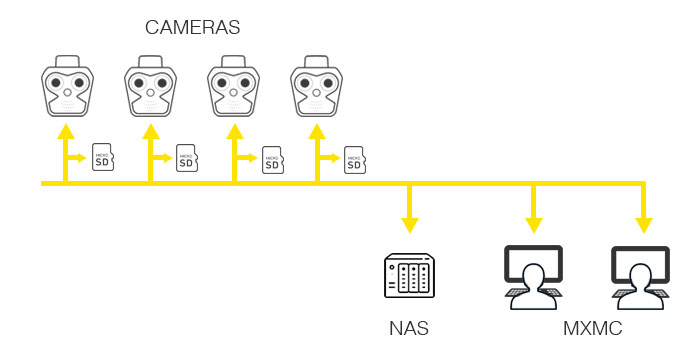
Compared to Centralized NVR or VMS Architecture
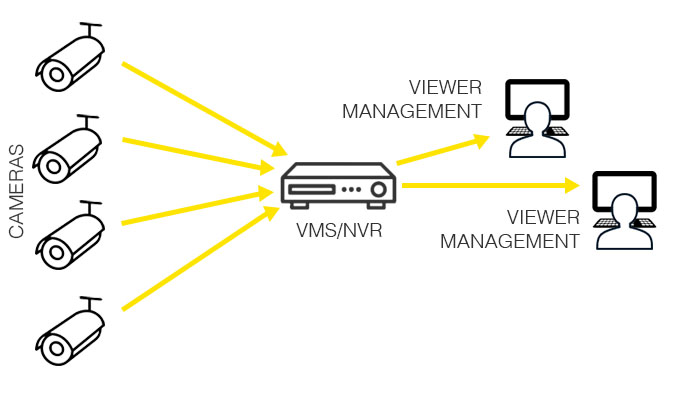
MxMC - The MOBOTIX Management Center
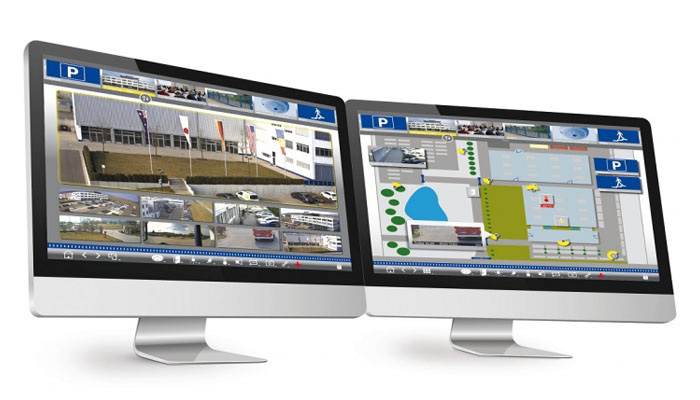
Viewing or accessing video is much more fool-proof or redundant on MOBOTIX systems. On the NVR/VMS solution, video is only viewable through the central NVR/VMS which is a point of failure. If a server is down, all cameras stop recording and nothing on any of the cameras can be seen. MOBOTIX offers free software to manage and see cameras or stored video called “MxMC.” This is both a management tool and a viewer and is simply a PC with MxMC software that acts as a window to the different cameras connected to the platform. If one “MxMC” instance is down, the others still work and, most important, all cameras are still recording to their respective NAS.
Last but not least, the local intelligence in the camera makes it easy to program local rules and actions that will be executed even if there is no central management or control connected to the camera for a while.This makes it possible for cameras to control water, temperature or even noise levels and control devices or relays - even fully autonomous ones - in the event of a network failure.
Taking MOBOTIX to the Next level - The Cloud
The autonomy and local intelligence of MOBOTIX cameras also make them the best cloud-based camera solution. Local intelligence lets cameras continue operating and executing planned missions even in the event of some intermittent or transient network outages. The MOBOTIX system never misses a beat and records and protects, always catching up and updating the cloud once connectivity is back - all without central processing.
MOBOTIX cameras are supported in the cloud by MxMSP/MxLINQ Cloud Services, a hosted cloud platform that requires zero software to be downloaded and securely manages MOBOTIX projects, creating a unique link for the user to his cameras. MxLINQ™ provides end-users secure access to all of their MOBOTIX cameras from the their device of choice (from smartphone to desktop) and provides access to all the unique key features the MOBOTIX platform offers be it MOBOTIX patented ActivitySensor, heatmaps, people/traffic counting on the analytics side, access to IoT features and information like local temperature, notifications and alerts the end user can self-manage. This even includes access to remote virtual buttons on their phones to open gates or turn on lights that are attached to the system!

Decentralized and Intelligent does not mean more Expensive.
Future Maintenance & Replacement Cost far Outweigh Perceived Savings when Buying Low-cost Security Products. The Cost of the Camera is less Important than its Durability.
Low-cost cameras do not only not offer the decentralized concept that MOBOTIX offers. They are also often plagued with security risk, materials defects that require replacement within 1-2 years which generates costly labor and associated downtime. Cheap quickly becomes expensive. Considering the cost of replacement, labor to repair and regular maintenance, low-cost cameras eventually far exceed the cost of investing in a quality solution like MOBOTIX from the beginning.
When choosing a camera system, the durability of the camera, meantime between failures and the operational redundancy of the MOBOTIX solution is unsurpassed in the market and provides users not only a vastly long-lasting product but also peace of mind and a much higher return on investment.






